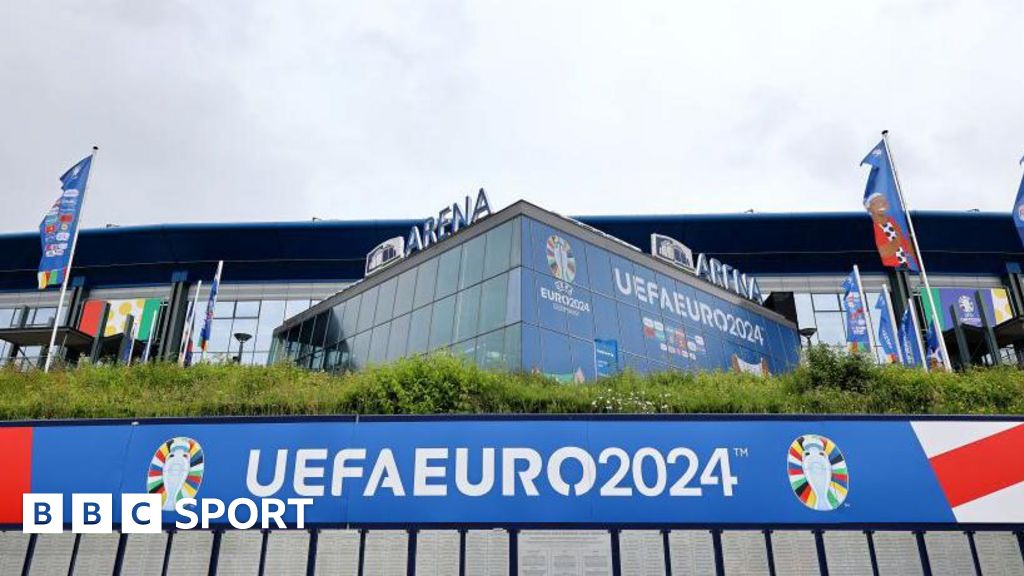Image source, Getty Images
German authorities have deemed England’s opening Euro 2024 match against Serbia on 16 June to be “high-risk”.
So how much concern really is there, and what measures are being put in place to prevent any trouble?
The local police in Gelsenkirchen have made it clear that the match could represent a security threat, highlighting a concern that 500 Serbian hooligans could be among several thousand supporters from the country expected to attend the match.
Only low-alcohol beer will be served at the stadium, and fans from the two countries will be kept apart, with more than 1,000 police officers on duty as part of a major security operation.
“The authorities rated that match from the start as high-risk” Andreas Schaer, the managing director of Euro 2024, told BBC Sport.
“But that was also about setting up preventative measures in Gelsenkirchen…for them to take all these actions they had to rate the match high-risk.”
“Serbia’s not been in the tournament for some time so there was some unknown factors – how are the two fan groups going to react? That is an open question. We as organisers are not that much concerned as our records do not show that there is a high risk of clashes, but of course the match has a bit of potential, if we’re not taking care, that it could escalate.”
Organisers say the apparent re-emergence of fan disorder across the European club game in the last two seasons is not a concern, and that a distinction has to be drawn with international football where there have been far fewer incidents.
In November, Serbia’s stadium was partially closed for a qualifier against Bulgaria after racist behaviour by fans during a match with Montenegro. The following month Manchester City confirmed they were working with police in Belgrade after reports some of their supporters were attacked before a Champions League game there.
Serbian fans have chanted in support of Russia’s invasion of Ukraine, with Red Star Belgrade retaining their sponsorship deal with Russian energy giant Gazprom. In March, Serbia agreed to play Russia in a friendly, the first European country to do so since Russia’s national team was banned by Uefa and Fifa following the invasion. However, some experts warn against assuming the worst.
“Despite their fearsome reputation, it has been more than a decade since Serbian fans caused any serious trouble at an international match outside their home country” says Guy Delaunay, the BBC’s Balkans correspondent.
“That was in 2010, when they caused the abandonment of a European Championship qualifier against Italy in Genoa. Even then, they were not targeting opposition fans, but claimed to be protesting against their own football association.
“Matches since then against English teams in European club competitions have been largely trouble-free. Liverpool, Spurs [twice] and Manchester United have all played in Belgrade and hosted either Red Star or Partizan without any serious incidents.“
‘I do not know of any history between England and Serbia’
Image source, Getty Images
Meanwhile, more than a quarter of a million England fans are expected to attend the most accessible major men’s tournament for them since Euro 2016.
In Gelsenkirchen, 40,000 English supporters are expected, and after the violence that marred the Euro 2016 match against Russia in Marseille, and the disorder that overshadowed the Euro 2020 final at Wembley, organisers will be desperate to avoid any repeat of such scenes.
British police have emphasised that there were only two arrests of England fans at the 2018 World Cup in Russia, and none in Qatar two years ago, and that 2,000 banning orders will prevent known troublemakers from travelling to Germany.
However they also acknowledge that a new generation of younger fans – of which the police will have little knowledge- will be travelling to their first overseas major tournament this summer.
“The England matches for us in the past were always a bit tricky but it’s less a violence issue and more sometimes that the fans tend a bit to drink a lot, and then we have some issues for the security checks” said Schaer.
“But [in] the stadium bowls we never had issues with fans. We must expect ticketless fans, but the cities are well prepared with the fan zones. People are really eager to welcome them.”
That is a sentiment shared by Michael Gabriel, the national lead for more than 70 supporter groups across Germany, who co-ordinates ‘fan embassies’ for visiting teams.
“I do not know of any history between England and Serbia so I’m really relaxed” he told BBC Sport.
“In 2006, I was the official fan representative in Frankfurt when 70,000 England fans visited and there were absolutely no problems. Before that tournament we told the authorities there was nothing to fear about the England fans and that’s the same now.”
The authorities will certainly hope that is the case ahead of this country’s first major men’s tournament since it hosted the World Cup in 2006, an event that released a burst of national pride and showcased a modern and unified Germany.
Eighteen years on, many here hope the Euros will prove a unifying and uplifting force at a time of mounting economic uncertainty and political upheaval in Germany.
“Times have changed. In 2006 the mood was much more friendly, more open to Europe, not as fractured as it is now” says Gabriel.
“These four weeks will open a window where things are better. Where people come together.“

